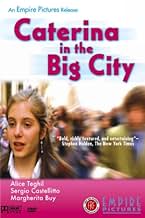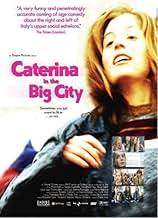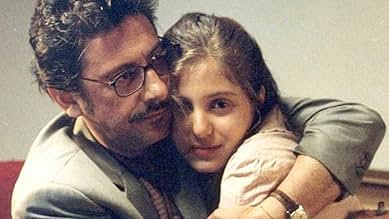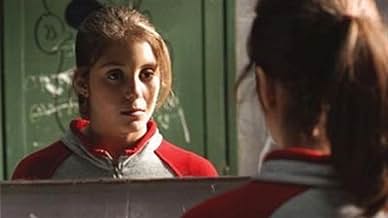VALUTAZIONE IMDb
6,8/10
3253
LA TUA VALUTAZIONE
Caterina, costretta a lasciare il suo piccolo paese all'età di tredici anni, affronta le complicazioni di vivere nella grande metropoli di Roma.Caterina, costretta a lasciare il suo piccolo paese all'età di tredici anni, affronta le complicazioni di vivere nella grande metropoli di Roma.Caterina, costretta a lasciare il suo piccolo paese all'età di tredici anni, affronta le complicazioni di vivere nella grande metropoli di Roma.
- Regia
- Sceneggiatura
- Star
- Premi
- 7 vittorie e 9 candidature totali
Zach Wallen
- Edward
- (as Zach -James Smith- Wallen)
Margerita Mazzola
- Martina
- (as Margherita Mazzola)
Martina Tasquetta
- Alessia
- (as Martina Taschetta)
Giulia Gorietti
- Giada
- (as Giulia Elettra Gorietti)
Recensioni in evidenza
CATERINA IN THE BIG CITY offers a novel and original approach to The Teen Genre. A timeless 'Coming of Age' tale is portrayed with truth and style, although the specifics of contemporary Italian politics lose a bit in translation, even a viewer who is ignorant of European politics is not left in the dark. Caterina (played by Alice Teghil) is a junior high school aged student who relocates to Rome with her family. Her father is a frustrated teacher who feels that his career has been sidetracked in the sleepy, coastal town of Monalto, and looks forward to the possibility of social and intellectual advancement in the big city. Soon, he runs up against the stratified nature of Italian society, and Caterina encounters the same setup, but within her school system. From her first day in class, she meets classmates who toss around political jeremiads which they don't really comprehend, but are very emotionally attached. Although, by the end of the school year, Caterina is moved and changed by her experiences, she seems to understand that these emotionally charged names and categories never tell the whole story, and really amount to passionate clichés. Paolo Virzì, the director, is known in Italy for his ability to examine the entrenched nature of Italian politics with humor and insight. CATERINA IN THE BIG CITY an intelligent look at what it is like to live in a stratified society, and to strive to locate your unique and proper place.
I saw 'Caterina va in Città' in Sydney, where the audience had mixed reactions to the schoolboy who speaks Italian with what's apparently meant to be a Sydneysider accent. In general, I was impressed by the ensemble acting, but I felt that the best performance was given by Margherita Buy as the heroine's mother Agata. I was disappointed that Agata has so little to do with the main plot of the film.
The symbolism is just a trifle heavy-handed in this movie. Remember those Hollywood war movies from World War Two, in which the bomber crew conveniently had one member of every (white) ethnic group? (And there was usually one rich guy and one guy from the slums.) Well, director/co-scriptwriter Paolo Virzi has got that gimmick here, Italian style. When 15-year-old Caterina's parents move house from a Tuscan seaside town to Rome and enrol her in a big-city school, the student body conveniently includes the full spectrum of Italy's national archetypes. For example, Daniela is wealthy, beautiful and popular, the daughter of an official in the right-wing government. Margherita is a left-wing 'revolutionary', the daughter of a famous intellectual. Of course, the film implies that Margherita is somehow better and more 'authentic' than Daniela.
Because I found the political subplots of this movie to be deeply clichéd -- especially since Italy is in no position to lecture any other nation on the subject of politics -- I was pleased that the film's political content stays firmly secondary. The main story of this movie is, rightly, Caterina's uneasy and awkward progress through adolescence and into adulthood. It's no surprise to discover that being a teenage girl in modern Italy is difficult, but surely every adolescent -- male, female, rich, poor, in any century or culture -- has found adolescence to be a difficult time of transition. Except for some of its political comments, I found this to be a very honest and intelligent film, with characters I really cared about. I'll rate 'Caterina va in Città' 8 out of 10, and I look forward to more films from Paolo Virzi. Brava, Caterina!
The symbolism is just a trifle heavy-handed in this movie. Remember those Hollywood war movies from World War Two, in which the bomber crew conveniently had one member of every (white) ethnic group? (And there was usually one rich guy and one guy from the slums.) Well, director/co-scriptwriter Paolo Virzi has got that gimmick here, Italian style. When 15-year-old Caterina's parents move house from a Tuscan seaside town to Rome and enrol her in a big-city school, the student body conveniently includes the full spectrum of Italy's national archetypes. For example, Daniela is wealthy, beautiful and popular, the daughter of an official in the right-wing government. Margherita is a left-wing 'revolutionary', the daughter of a famous intellectual. Of course, the film implies that Margherita is somehow better and more 'authentic' than Daniela.
Because I found the political subplots of this movie to be deeply clichéd -- especially since Italy is in no position to lecture any other nation on the subject of politics -- I was pleased that the film's political content stays firmly secondary. The main story of this movie is, rightly, Caterina's uneasy and awkward progress through adolescence and into adulthood. It's no surprise to discover that being a teenage girl in modern Italy is difficult, but surely every adolescent -- male, female, rich, poor, in any century or culture -- has found adolescence to be a difficult time of transition. Except for some of its political comments, I found this to be a very honest and intelligent film, with characters I really cared about. I'll rate 'Caterina va in Città' 8 out of 10, and I look forward to more films from Paolo Virzi. Brava, Caterina!
10Andy-296
This excellent Italian comedy is very similar in plot to Mean Girls (who came out in about the same time). The difference is that this is a much more politicized film. Caterina is a shy teenager from a small town in Italy, who moves to Rome with her long-suffering mother and her teacher father, when he is assigned to a new job there. In her new school, she has to choose to what clique to belong: the children of the progressive intellectuals or the children of the rich industrialists. The left or the right. What this film says is that these people are not terribly different between themselves. They both hold a degree of fame and power in Italian society, and look down upon those who don't. The outstanding performance in the movie is that of Caterina's father, the teacher Giancarlo (Sergio Castellito), a hothead angry that others have gotten all the breaks in life, who rants against the rich and privileged but who would sell his soul in a second in order to join the establishment. He is a familiar type of malcontent in real life but one who is seldom shown in the movies. There is a silly subplot of Caterina falling in love with an Australian boy (What they did that for? To reach an international market?), but all in all, this is one of the best Italian movies of the last years.
Caterina gives us an opportunity to feel and a chance to hope. A young girl both naive and somehow mature, she is unsure of what she wants in life. Her task is learning to navigate the waters of a high school in Rome where she is the new girl from the sticks when her father is transfered from a small town on the coast. He fulfills his dream of returning to the cultural mecca of the capital where he hopes to take his "rightful" place among the intelligentsia. But the film turns on just this point"rightful place". There are no simple answers, though we do have an opportunity to see how complex it is to find one's place, rightful or not, in the world. Caterina is something of a metaphor for the Italian populace at large, I would think. But she is more than this. There is something about her story that touched me, several decades and half a world away from the world she inhabits, a world stratified by cliques and patronage, prejudice and injustice...a world very much like the one I live in and the one I imagine most of us live in. Caterinaas the film that bears her namedoes not take the easy way out in running away or self-repression or living a life of quiet desperation, even when her sheltered provincial upbringing and less-than-ideal family situation do not give her any clues on how to deal with her new life and classmates from prominent families. She tries to adjust to the fast-pace and superficiality of life in the Italian capital, and much of the fun of the movie is seeing her in the various situations she encounters along the way. Her father is great as the frustrated writer with no talent and a loud voice, a self-important boor. My heart goes out to all the Caterinas of the world, who go forward with optimism and pure heart even when they know the odds are against them.
I wish I could say that this was a great film because there really were a lot of things that one could like about it.
As it turns out, however, it is a good, but flawed film. I will give this film a recommendation, I think it is worth seeing.
The film made a number of incredible social statements. It really cuts to the quick about the nature of society, the people who can manipulate the system on both sides are in collusion with each other to keep their privilege. The people who are on the outside find themselves on the outside, looking in. They can be taken under someone's wing but they are never really more then a pet, the Jimmy Olsen to someone's Superman.
The film had spectacular acting, particularly from the lead.
So what then keeps the film from being great? One of the biggest problems comes from the episodic and picaresque structure of the film. It has the kind of structure that is more interesting because of its discontinuity then because of its continuity. And while it makes for a lot of interesting discussions, this could turn a lot of people off, probably even more then the subtitles.
Honestly, the problem is that it begins with Caterina being pulled in many directions and it allows us to see facets of her through these different social lenses. The trouble is that we never get a baseline reading on her in the beginning before she moves to Rome. This is done very well but we never get the impression of her as anything more then a tablet that the ideologies of others are being written on, even at the end of the film when she supposedly finds herself. I won't give a spoiler as to how but the ending that someone else commented was her in her element is really just another case of this.
You know what, I've changed my mind. This is a wonderful film to watch. Its a spectacular way to look at what life is really like when you are outside the powerful and privileged circles of society and you can only be influenced by the ideologies of others but you really lack any voice of your own.
Watch this along with Welcome to the Dollhouse and see what life was like for the rest of us. Let this film show you the social cliques, collusion and ideology and let Solondz show you the sheer cruelty of a society that, as J. G. Ballard said, normalized psychopathy. And see it for what it really is, not some sugarcoated network television version (I think you guys know what very popular television series I'm talking about).
As it turns out, however, it is a good, but flawed film. I will give this film a recommendation, I think it is worth seeing.
The film made a number of incredible social statements. It really cuts to the quick about the nature of society, the people who can manipulate the system on both sides are in collusion with each other to keep their privilege. The people who are on the outside find themselves on the outside, looking in. They can be taken under someone's wing but they are never really more then a pet, the Jimmy Olsen to someone's Superman.
The film had spectacular acting, particularly from the lead.
So what then keeps the film from being great? One of the biggest problems comes from the episodic and picaresque structure of the film. It has the kind of structure that is more interesting because of its discontinuity then because of its continuity. And while it makes for a lot of interesting discussions, this could turn a lot of people off, probably even more then the subtitles.
Honestly, the problem is that it begins with Caterina being pulled in many directions and it allows us to see facets of her through these different social lenses. The trouble is that we never get a baseline reading on her in the beginning before she moves to Rome. This is done very well but we never get the impression of her as anything more then a tablet that the ideologies of others are being written on, even at the end of the film when she supposedly finds herself. I won't give a spoiler as to how but the ending that someone else commented was her in her element is really just another case of this.
You know what, I've changed my mind. This is a wonderful film to watch. Its a spectacular way to look at what life is really like when you are outside the powerful and privileged circles of society and you can only be influenced by the ideologies of others but you really lack any voice of your own.
Watch this along with Welcome to the Dollhouse and see what life was like for the rest of us. Let this film show you the social cliques, collusion and ideology and let Solondz show you the sheer cruelty of a society that, as J. G. Ballard said, normalized psychopathy. And see it for what it really is, not some sugarcoated network television version (I think you guys know what very popular television series I'm talking about).
Lo sapevi?
- QuizSara Pallini's debut.
- BlooperThe story begins in 2003, but the dates do not match up with the days of the week for that year.
- ConnessioniReferences The Blues Brothers - I fratelli Blues (1980)
- Colonne sonoreInno ufficiale dei giovani fascisti
Music by Giuseppe Blanc and lyrics by Vittorio E. Bravetta
Sung at the wedding reception
I più visti
Accedi per valutare e creare un elenco di titoli salvati per ottenere consigli personalizzati
- How long is Caterina in the Big City?Powered by Alexa
Dettagli
Botteghino
- Lordo Stati Uniti e Canada
- 296.464 USD
- Fine settimana di apertura Stati Uniti e Canada
- 9352 USD
- 5 giu 2005
- Lordo in tutto il mondo
- 4.407.426 USD
- Tempo di esecuzione1 ora 47 minuti
- Colore
- Mix di suoni
- Proporzioni
- 2.35 : 1
Contribuisci a questa pagina
Suggerisci una modifica o aggiungi i contenuti mancanti





















